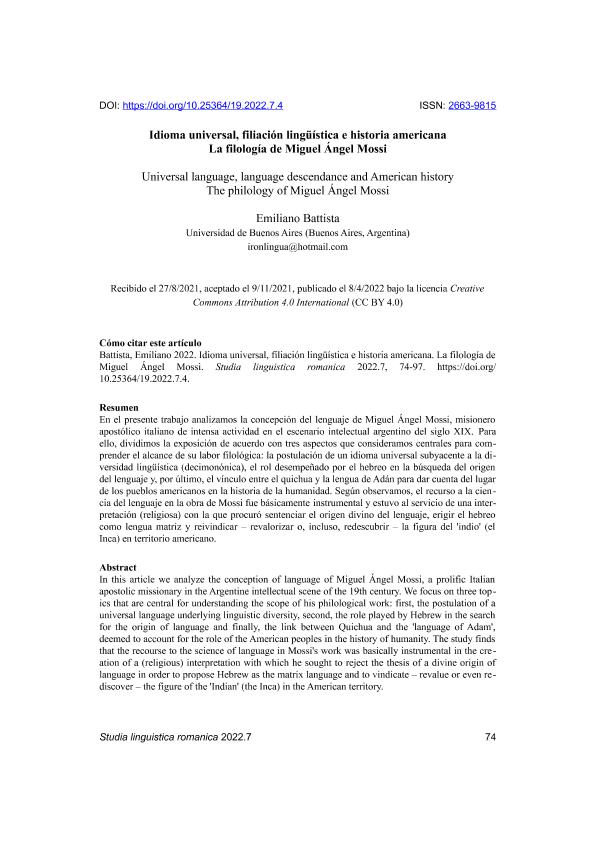Artículo
En el presente trabajo analizamos la concepción del lenguaje de Miguel Ángel Mossi, misionero apostólico italiano de intensa actividad en el escenario intelectual argentino del siglo XIX. Para ello, dividimos la exposición de acuerdo con tres aspectos que consideramos centrales para comprender el alcance de su labor filológica: la postulación de un idioma universal subyacente a la diversidad lingüística (decimonónica), el rol desempeñado por el hebreo en la búsqueda del origen del lenguaje y, por último, el vínculo entre el quichua y la lengua de Adán para dar cuenta del lugar de los pueblos americanos en la historia de la humanidad. Según observamos, el recurso a la ciencia del lenguaje en la obra de Mossi fue básicamente instrumental y estuvo al servicio de una interpretación (religiosa) con la que procuró sentenciar el origen divino del lenguaje, erigir el hebreo como lengua matriz y reivindicar – revalorizar o, incluso, redescubrir – la figura del 'indio' (el Inca) en territorio americano. In this article we analyze the conception of language of Miguel Ángel Mossi, a prolific Italian apostolic missionary in the Argentine intellectual scene of the 19th century. We focus on three topics that are central for understanding the scope of his philological work: first, the postulation of a universal language underlying linguistic diversity, second, the role played by Hebrew in the search for the origin of language and finally, the link between Quichua and the 'language of Adam', deemed to account for the role of the American peoples in the history of humanity. The study finds that the recourse to the science of language in Mossi's work was basically instrumental in the cre - ation of a (religious) interpretation with which he sought to reject the thesis of a divine origin of language in order to propose Hebrew as the matrix language and to vindicate – revalue or even rediscover – the figure of the 'Indian' (the Inca) in the American territory.
Idioma universal, filiación lingüística e historia americana: La filología de Miguel Ángel Mossi
Título:
Universal language, language descendance and American history: The philology of Miguel Ángel Mossi
Fecha de publicación:
04/2022
Editorial:
Universidad de Graz
Revista:
Studia linguistica romanica
ISSN:
2663-9815
Idioma:
Español
Tipo de recurso:
Artículo publicado
Clasificación temática:
Resumen
Palabras clave:
HISTORIA
,
MOSSI
,
SIGLO XIX
,
FILOLOGÍA
Archivos asociados
Licencia
Identificadores
Colecciones
Articulos(SEDE CENTRAL)
Articulos de SEDE CENTRAL
Articulos de SEDE CENTRAL
Citación
Battista, Emiliano; Idioma universal, filiación lingüística e historia americana: La filología de Miguel Ángel Mossi; Universidad de Graz; Studia linguistica romanica; 7; 4-2022; 74-97
Compartir
Altmétricas




